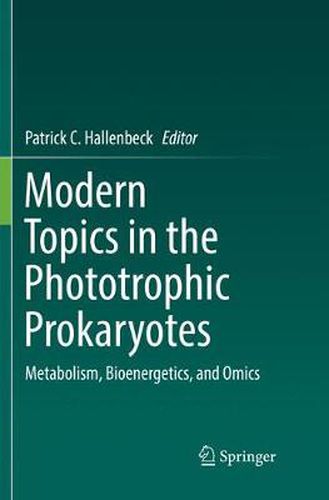Readings Newsletter
Become a Readings Member to make your shopping experience even easier.
Sign in or sign up for free!
You’re not far away from qualifying for FREE standard shipping within Australia
You’ve qualified for FREE standard shipping within Australia
The cart is loading…






This book offers authoritative contributions by world experts actively working on different aspects of phototrophic prokaryotes. Providing up-to-date information in this rapidly advancing field, it covers the range of topics that are currently the focus of research with this group of organisms. As essentially single-celled organisms, phototrophic prokaryotes process many environmental signals and use this information to optimize their metabolism, growth rate, DNA replication and cell division.
Phototrophic prokaryotes are collectively of great interest for a number of different fundamental and applied perspectives and have long served as models for understanding such basic fundamental biological processes as photosynthesis and respiration. On an ecological/environmental level they are extremely important, being the most abundant photosynthetic organisms on earth and responsible for the majority of the primary productivity in the oceans. They also hold great promise as biotechnological catalysts, being able to couple solar energy conversion through photosynthesis and carbon fixation to the production of biofuels, commodity chemicals and nutraceuticals.
The book is recommended to advanced students and scientists dealing with life sciences, especially in genetics, microbiology and molecular biology.
$9.00 standard shipping within Australia
FREE standard shipping within Australia for orders over $100.00
Express & International shipping calculated at checkout
This book offers authoritative contributions by world experts actively working on different aspects of phototrophic prokaryotes. Providing up-to-date information in this rapidly advancing field, it covers the range of topics that are currently the focus of research with this group of organisms. As essentially single-celled organisms, phototrophic prokaryotes process many environmental signals and use this information to optimize their metabolism, growth rate, DNA replication and cell division.
Phototrophic prokaryotes are collectively of great interest for a number of different fundamental and applied perspectives and have long served as models for understanding such basic fundamental biological processes as photosynthesis and respiration. On an ecological/environmental level they are extremely important, being the most abundant photosynthetic organisms on earth and responsible for the majority of the primary productivity in the oceans. They also hold great promise as biotechnological catalysts, being able to couple solar energy conversion through photosynthesis and carbon fixation to the production of biofuels, commodity chemicals and nutraceuticals.
The book is recommended to advanced students and scientists dealing with life sciences, especially in genetics, microbiology and molecular biology.